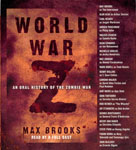
 World War Z: An Oral History of the Zombie War
World War Z: An Oral History of the Zombie War
By Max Brooks; Read by a full cast
5 CDs – 6 hours – [ABRIDGED]
Publisher: Random House Audio
Published: 2006
ISBN: 0739340131 ;ISBN-13: 9780739340134
Themes: / Horror / Zombies / War / Politics / Apocalypse
For my birthday last year, my wife got me a subscription to The Believer, a magazine for bibliophiles put out by the good people at McSweeney’s Publishing (Dave Eggers, Michael Chabon, Nick Hornby, and Rick Moody have all been involved with McSweeney’s in one way or another; sci-fi fans would do well to check out both McSweeney’s Mammoth Treasury of Thrilling Tales and their Enchanted Chamber of Astonishing Stories I was pleasantly surprised to open up to the 2006 Believer Book Awards in the last issue and find at least two science fiction novels listed in the top 40 (two that I recognized as such, anyway). Cormac McCarthy’s The Road was number one; not too shocking given McCarthy’s extensive, “respectable” (read: non-sci-fi) bibliography. The other was more of a surprise; Max Brooks’ World War Z: An Oral History of the Zombie War. I’d listened to the audio version of the novel months ago, and enjoyed the hell out of it, but it was kind of shocker to see a book about zombies written by Mel Brooks’ kid rubbing elbows with the new ones from Pynchon, Munro, Roth, and Virgil. Chalk some of the success up to Brooks’ connections, chalk some of it up to the inexplicably universal appeal of zombies, but give credit where it’s due and realize that World War Z is a well-written novel, and remarkable, given the crudity of the titular characters, in its subtlety and nuance.
Brooks presents the novel as an actual historical document of the spread of the virus that results in “zombiism,” and the reaction of the various nations to the problem. The book is structured as a series of interviews with representatives from around the world with Brooks himself as interviewer, and the device works well. Brooks has obviously done his homework; it’s not much of a reach to imagine Chinese bureaucrats engaging in an elaborate coverup of the spread of the virus (poisoned dogfood anyone?), South Africa deciding on a cold-hearted but necessary policy of abandoning the portion of the populace exposed to the virus, or the U.S. entertainment industry attempting to make a reality show of the zombie attack. The only part of the political description that felt a little unrealistic was Brook’s characterization of Israel’s generosity in its offer of asylum to Palestinian refugees before completely closing its borders for the duration of the war.
The decision to paint something as visceral as a zombie attack in the broad strokes of policy and strategy is an interesting one. Zombies have heretofore been portrayed mostly in the more action-friendly medium of cinema, and mostly from an up-close, short-term perspective. Brooks avoids the trap of becoming too impersonal and detached from the war by grounding the novel in the first-person reminiscences of the folks who lived through it. It’s impossible not to develop some attachment to the Canadian girl who describes the effects of the northern winter on the ill-prepared refugees looking to escape the warm-weather-dependent zombies, and the blind Japanese gardener’s account of his daily battles with the walking dead is strangely tranquil and moving.
The first thing you’ll notice about the audio version of World War Z are the cast members listed on the cover. Alan Alda, John Tuturro, Henry Rollins and, wait for it, Mark Hamill all contribute their voices to the project. Not quite A-listers, maybe, but definitely in the B or B+ range. Give it a little more time and Hamill might start being known first as a solid voice actor and secondly as that guy from the Star Wars that didn’t suck. He’s particularly effective in this production, as an American soldier reminiscing about the ups and downs of the military’s encounter with the zombies. Turns out the U.S. military was operating on an obsolete wartime paradigm and was ill-equipped to deal with an enemy that doesn’t fit the old model of nation-on-nation warfare. Hm.
The rest of the cast fares as well as Hamill; it’s admirable that the producers of the audiobook went to the trouble of securing actors that actually hail from the area they represent in the book. The genuineness of the accents is apparent and is definitely preferable to having some Rich Little-type give his impersonation of a Cuban.
So, whether you’re a zombie-loving, George Romero-worshiping, Shaun Of The Dead-reciting, walking dead aficionado; a history-channel-watching, political science-junkie; or just an audiobook listener with a taste for the unique, you’ll be welcome among the growing ranks of the scholars of dubya-dubya Z.

Great review. I’ve read the book, and look forward to listening to the audio version.
But I feel the need to correct, or update you knowledge in one regard, and that is in regards to Mark Hamill possibly becoming known as a solid voice actor. as an animation afficionato I can tell you that Mark Hamill already has that reputation. He is best known for his role as The Joker in the 90’s Batman: The Animated Series, but has also voiced many other characters.